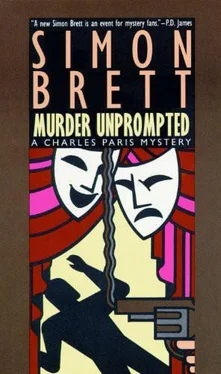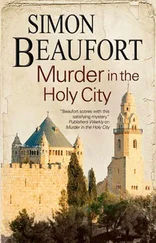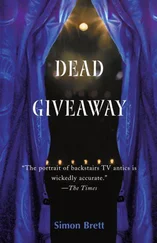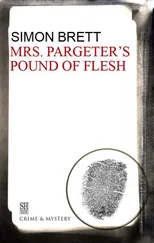Simon Brett - Murder Unprompted
Здесь есть возможность читать онлайн «Simon Brett - Murder Unprompted» весь текст электронной книги совершенно бесплатно (целиком полную версию без сокращений). В некоторых случаях можно слушать аудио, скачать через торрент в формате fb2 и присутствует краткое содержание. Жанр: Криминальный детектив, на английском языке. Описание произведения, (предисловие) а так же отзывы посетителей доступны на портале библиотеки ЛибКат.
- Название:Murder Unprompted
- Автор:
- Жанр:
- Год:неизвестен
- ISBN:нет данных
- Рейтинг книги:5 / 5. Голосов: 1
-
Избранное:Добавить в избранное
- Отзывы:
-
Ваша оценка:
- 100
- 1
- 2
- 3
- 4
- 5
Murder Unprompted: краткое содержание, описание и аннотация
Предлагаем к чтению аннотацию, описание, краткое содержание или предисловие (зависит от того, что написал сам автор книги «Murder Unprompted»). Если вы не нашли необходимую информацию о книге — напишите в комментариях, мы постараемся отыскать её.
Murder Unprompted — читать онлайн бесплатно полную книгу (весь текст) целиком
Ниже представлен текст книги, разбитый по страницам. Система сохранения места последней прочитанной страницы, позволяет с удобством читать онлайн бесплатно книгу «Murder Unprompted», без необходимости каждый раз заново искать на чём Вы остановились. Поставьте закладку, и сможете в любой момент перейти на страницу, на которой закончили чтение.
Интервал:
Закладка:
He slept a lot of the Sunday and Monday and, when awake, just mooched about his bed-sitter in the gloom that inevitably followed moments of high excitement.
He thought of ringing Frances, but something deterred him. She had spoken of meeting the following weekend and going down to Juliet’s. That possibly meant that she had something else on this weekend. Or would be busy sorting things out at school with the run-up to half-term. He didn’t feel up to the mildest of rebuffs from her; he seemed to have got back to a relationship like an adolescent infatuation, reading rejection in the most innocent of her actions.
His mood also deterred him from ringing Dottie Banks. It was something he still intended to do, but he felt he should be at a peak of confidence to arrange such an encounter.
Still, the rest did him good, and the performance on the Monday evening was better. It was well received by a fairly small house. About a third full. The publicity of Michael Banks’s death had now been replaced in the public’s mind with news of fresh disasters, and the show was running on its own impetus. The Variety Theatre’s position off the main West End beat, the obscurity of the play, and the (pace George Birkitt) lack of star names — all the elements which pessimists had predicted would work against the show — were now beginning to take their toll.
Paul Lexington seemed, as ever, undaunted by the small audience. It was Monday night, he said, and that was always bad. The following for this kind of play would build up by word-of-mouth, he insisted. The coach-parties hadn’t started to come in yet. And he was going to give a rocket to Show-Off, whose performance on the publicity front had been absolutely dismal. Get another burst of publicity in the second week, and the show would be fine. Every production went through troughs.
As ever, he sounded terribly plausible, and Charles was as willing as all the rest of the cast to believe what he said. How true it all was, Charles didn’t wish to investigate. And how the show was now funded, how tightly Paul Lexington was running his budget, what his break-even percentage of audience was, indeed how much of the audience was made up of paying theatre-goers and how much of free seats; all these were questions to which he knew he was unlikely to get answers.
All they could do was work from day to day, from performance to performance, and through the second week, Charles started to feel his confidence in the part building up again. The play settled down with its new cast. The size of the audience didn’t increase noticeably, but the faithful few who did turn up seemed appreciative.
He even got another nice review. Obviously there had been no notices after the first night, and few of the critics of the major papers would have had time, let alone interest, to give the play a second viewing; but a North London local paper with a weekly deadline had sent along its critic on the Monday of the second week, and their review appeared on the Thursday.
The significant sentence read as follows: ‘The part of the father, played by an actor unfamiliar to me, Charles Paris, grows in stature through the evening until the powerfully climactic scene of confrontation with his daughter.’
It was not, of course, unambiguous praise. Indeed, it could have been read merely as appreciation of Malcolm Harris’s writing; it was the part, after all, not the acting, which was said to grow in stature. And, to the cynically analytical mind which Charles usually applied to praise, the review could be read to mean that the part grew in stature until the powerfully climactic scene of confrontation with his daughter, at which point, in the hands of this actor, it diminished considerably.
But, on the whole, he thought it was good. Like all actors with reviews, he checked through it for quotability, and decided that, with only slight injustice to the meaning, and the excision of a comma, he could come up with the very serviceable sentence, ‘Charles Paris grows in stature through the evening’.
He even wondered if he ought to suggest to Paul Lexington that that sentence was put on a hoarding outside the theatre, but didn’t quite have the nerve. The Producer had been satisfied with snipping out from the same review the words, ‘a thoroughly solid evening’s entertainment’, to join the other encomiums that guarded the Variety’s portals.
(These others, incidentally, demonstrated once again Paul Lexington’s very personal definition of truth and his skill in the use of small print. Since he hadn’t got any London press reviews, he had used the Taunton ones, and artfully disguised their provenance. Thus the passerby would observe in large letters the exhortation, ‘I urge everyone to go and see The Hooded Owl now! — Times ’. He would have to go very close indeed to the hoarding to read the word ‘Taunton ’ between ‘now!’ and ‘ Times ’.
In the same way, the Observer , which acclaimed ‘an evening of theatrical magic’, was the Quantock Observer ; and the Mail , who had ‘rarely been so entertained’, was the Western Mail .
The cheekiest of the lot was actually from a London newspaper. ‘One of the greatest dramas in the history of the British Theatre’ was, as its by-line claimed, from The Daily Telegraph; it had come, however, not from the Arts page, but from the front-page description of Michael Banks’s murder.
There were no flies on Paul Lexington.)
Charles cut out and kept his probably-nice review. He never kept bad ones. That was not just vanity. He always found that, while he could never exactly fix the wording of the good ones, the bad remained indelibly printed on his brain, accurate to the last comma.
Though over thirty years had passed, he could still remember how his first major role for the Oxford University Dramatic Society had been greeted by an undergraduate critic (who, incidentally, later became a particularly malevolent Minister of Health and Social Security):
‘Charles Paris had a brave stab at the part, but unfortunately it did not survive his attack’.
On the Wednesday matinee, when the house was minimal and so was the cast’s concentration, Charles came rather unstuck with his deaf-aid.
To be honest, it wasn’t his fault. Or it wasn’t completely his fault. He got fed the wrong line.
Inevitably, it was in the Hooded Owl speech, the play’s focus for either triumph or disaster. Charles had just turned to face the glass case, having made the analogy of the Hooded Owl and God. The line he should have received next was, ‘Why not? This stuffed bird has always been in the room.’ But, unfortunately, what the A.S.M. read to him was, ‘Why not? This bird has always been stuffed in this room.’
And, even more unfortunately, that was the line Charles repeated. The audience probably didn’t notice anything wrong; their reactions were so minimal, anyway, that it hardly mattered. But Lesley-Jane certainly did, and she started to giggle. That, and the mild hysteria that a tiny audience always engenders, got Charles going too, and the pair of them were almost paralysed by laughter. It was what actors call a total ‘corpse’, and, although they managed to get through to the end of the play, any tension they might have built up was dissipated.
The lapse was duly noted by the Stage Manager and no one was surprised to be summoned on stage at the ‘half’ for the evening show, and receive a dressing-down from the Company Manager.
‘You’re all meant to be professionals,’ Wallas Ward berated them petulantly, ‘and this sort of behaviour is unforgivable. We already have our problems with this show, and we’re at a very pivotal point. If we are to survive in the West End, we have to guarantee that every performance is up to scratch. Nothing brings a show’s reputation down quicker than the rumour going round the business that the cast has started sending it up. You really should know better.’
Читать дальшеИнтервал:
Закладка:
Похожие книги на «Murder Unprompted»
Представляем Вашему вниманию похожие книги на «Murder Unprompted» списком для выбора. Мы отобрали схожую по названию и смыслу литературу в надежде предоставить читателям больше вариантов отыскать новые, интересные, ещё непрочитанные произведения.
Обсуждение, отзывы о книге «Murder Unprompted» и просто собственные мнения читателей. Оставьте ваши комментарии, напишите, что Вы думаете о произведении, его смысле или главных героях. Укажите что конкретно понравилось, а что нет, и почему Вы так считаете.












